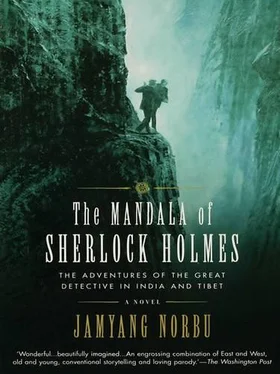'Then you noticed the gleaming towers of the monastery in the distance, and your thoughts seemed to lift a littlefrom their previous despondency. You gazed up at the open sky. Your expression was quizzical but not entirely melancholy. Probably you were asking yourself if religion had the answer to human suffering, where science did not. It was then that I ventured to agree with you.'
'Wah! Shabash! Mr Holmes. This is more astounding than any magic,' I exclaimed, amazed at this revelation of yet another facet of his genius. 'You followed my thought process with extraordinary precision. A most remarkable feat of reasoning, Sir.'
'Pooh. Elementary, my dear Hurree.'
'But how was it done, Mr Holmes?'
'The trick is to construct one's chain of reasoning from the initial premise of umm… let us say, "dependent origination", to use this profound Buddhist concept. Then from a drop of water you could logically infer the possibility of a Pacific or a Niagara without having seen or heard of one or the other. So all life is a great chain, the nature of which is known whenever we are shown a single link of it.' [30]
The monastery was perched on a hill, below which was the settlement of Tradun. It was a regular bustling metropolis for those parts, consisting of over twenty houses, besides a number of nomad tents scattered over the bleak plains. We were somewhat close to the kingdom of Nepaul from here, and I noted three distant ice peaks rising from that direction. [31]
It took us another three weeks to get to Shigatse. We were fortunate to be able to visit the great monastery of Tashi Lhunpo and see its treasures; but we avoided going anywhere near the Chinese consulate, which was to the west of the town. Kintup and I had too many unhappy memories of the place from our last visit. We heard all kinds of rumours in the bazaar about the intrigues of the Manchu Amban in Lhassa and his assistant here in Shigatse, and the imminence of an invading Chinese army. But we could place no credence on any of these stories.
From Shigatse it was about a ten-day journey to Lhassa.
We reached Lhassa in the late afternoon of the 17th of May, 1892. When we came around the last bend on the pilgrim road from Gyangtse, we had our first view of the great Potala palace floating high above the green barley fields of the Kyichu (Happy River) valley.
The Potala was initially constructed in the Water-Bird year (1645) by the fifth Grand Lama, or Dalai Lama, to give his actual title. There is evidence to suggest that the central structure, the ' Red Palace ', had been in existence since the seventh century, the time of the ancient Thibetan kings. The building is named after Mount Potalaka in South India, one of the holy mountains of the Hindu god Shiva. Buddhists, however, believe that the mountain is sacred to Avalokitesvara, the Buddha of Compassion, whom they maintain is the Grand Lama, in his divine form. The Potala palace would be a formidable structure anywhere in the great metropolises of the world, but in the bleak wilderness of the Thibetan landscape such a monumental creation of human genius and energy assumed awe-inspiring dimensions.
Only one white man, Thomas Manning, had ever set eyes on it before; [32] and in our Department only K.21 had seen it before me. I humbly thanked my Maker for granting me this privileged sight. I could see that the scene had a similar effect on my companions. Tsering, Kintup and the other Buddhists dismounted and prostrated themselves on the ground in reverence. Even Gaffuru, the staunch Mohameddan, was moved to offer a respectful salaam towards it. Mr Holmes's eyes seemed to fill with a calm bliss as they gazed at the distant Potala. His stern brows, ever knotted in intense cerebration, gradually relaxed, permitting a gentle smile to break out on his face.
All the trials and hardships of the journey seemed to magically lift off our shoulders. With light hearts and good cheer we proceeded to the holy city.
Following the pilgrim road we proceeded through an avenue of trees, passing gardens and orchards that supply the Lhassa markets with vegetables and fruits, across parks, past fields and shaggy stretches of woodland. The air was delightfully free from dust, that plague of Shigatse, and this was doubtless due to the marshes and far reaching network of streamlets which give Lhassa its refreshing green and luxuriant vegetation. Although the sparkling streams are teeming with fat trout, no fishing may be done here, nor any killing of birds, lest a transmigrated human-life may thus be sacrificed. The banks of these numerous brooklets are a mass of blossoms of wild flowers trying to outvie each other in gaudy tints: scented potentilla, magenta and blue daisies, buttercups, primulas and harebells. Up the valley one could see the fields of ripening barley stretching like a sea for miles. Harvesters had commenced work, singing in light-heartedness, the women wearing garlands of yellow clematis.
We passed a small funeral party. The dead body was carried doubled up in a sitting posture and wrapped in a blanket. Most probably it was being taken to a cemetery outside the city where it would be disposed of in the rather gruesome but traditional manner by being cut to pieces and fed to vultures and ravens. As Manning, in the account of his travels, quaintly puts it, 'They eat no birds, but, on the contrary, let the birds eat them.'
We entered the city by the famous western gate, which is actually a large stupa with a passage through it. With us was a group of noisy pilgrims from Tsang province, which helped not to draw too much attention to our small caravan. Our guide, Tsering, led us through streets crowded with pilgrims, monks, beggars, swaggering bravos and silk-clad gendemen. Ladies wearing fantastic head-dresses rode by, accompanied by their servants, while their less fortunate sisters walked, some carrying small wooden barrels of water on their backs. Nomads, clad from head to foot in sheepskin, held each other's hands for safety. Women from Khams, or Eastern Thibet, with hair braided into a hundred and eight separate plaits, spun large prayer wheels in pious, if mechanical ritual. Merchants from Turkestan, Bhootan, Nepaul, China and Mongolia displayed in their stalls a rich array of goods: tea, silk, fur, brocades, turquoise, amber, coral, wines and dried fruits and even humble needles, thread, soap, calico, spices and trinkets from the distant bazaars of India. Lhassa is a surprisingly cosmopolitan town, with merchants and travellers from not only the countries I have just mentioned, vide supra, but also Armenians, Cashmiris and Muscovites.
Finally after what seemed like endless twists and turns through narrow streets and dark alleys, we came before a high wall surrounding a mansion. Tsering banged his fist on the massive wooden gate and shouted for attention. A moment later the gate opened and we rode into a large courtyard. The gate shut quickly behind us. Mr Holmes and I were ushered into a well-appointed chamber, decorated in the Thibetan fashion with religious paintings (thangka) and ritual objects, and the floor covered with rich carpets and divans. We were served tea and Huntley & Palmer's chocolate-cream biscuits.
Tsering left to report our arrival to the Grand Lama's secretary. He requested us to remain in the house till he returned and not to go out in the streets. Anyhow, both Mr Holmes and I were tired, the exhaustion of the journey finally catching up with us. After a warm bath and a good dinner, served by silent, well-trained servitors, we went to bed. The beds were soft, the sheets clean, and the quilts warm. We slept like the proverbial logs.
I had just finished my morning ablutions, chanted a brief Brahmo Somajist hymn (of a theistical nature), and popped the first betel nut of the day into my mouth, when Sherlock Holmes appeared at the door.
Читать дальше












